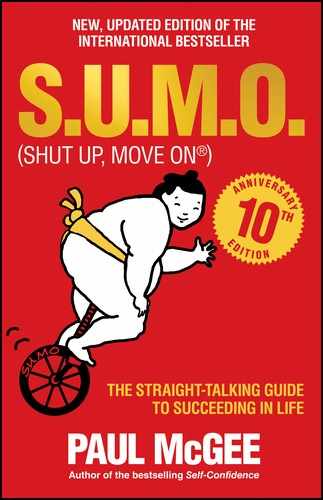The Personal Postscript
Ten years on from first writing this book so much seems to have changed. Not just in the world, but in my own personal life. The SUMO philosophy has opened up so many new opportunities for me. One included sharing a stage with the late Dr Stephen Covey, author of the book 7 Habits of Highly Effective People. As a result of that talk at the Sydney Convention Centre I have gone on to work in one of my favourite countries on the planet, Australia.
But perhaps one of the most memorable days of my life, which came about as a result of the book, was when I got a chance to spend a day in Kibera, just outside Nairobi in Kenya. Kibera is reputed to be the largest slum area in the whole of the African continent. Along with my friend Paul Sandham I had the privilege to deliver the SUMO message in two schools and a college within Kibera. We even distributed SUMO books to teachers.
The day was memorable, though, for the conversation I had with Felix, the headteacher in one of the schools. He was desperate for me to talk to his pupils. I, however, felt a little uncomfortable doing so. The reason was simply this: many of the children had no shoes. Their uniforms were more like poorly sewn together rags. I remarked, ‘Felix, what these children need is shoes and new uniforms, not me talking to them’.
‘Wrong,’ replied Felix. ‘We can get new shoes and uniforms, but what you bring is hope and inspiration. These children need to change their beliefs about who they are and where they’re heading.’
And I’ll never forget his next words: ‘They need to realize they may have been born in a slum, but they don’t need to die in a slum.’
I’m guessing most of you are not faced with the same challenges as Felix and his pupils. But we still all face situations that can be incredibly challenging: ill health, redundancy, the loss of a loved one, the breakdown of a long-term relationship. None of us are immune from any of these. But what I hope the SUMO approach does is to equip and encourage you to deal with such situations with greater self-compassion, confidence and increased courage.
Along the way we will make mistakes but, as I learnt from Felix, wherever we’re at now doesn’t have to be our final destination. The journey continues, and we can create a better future whatever our current circumstances.
For some of you, though, life is rather good as it is. Great. Just remember, SUMO is not just to help you deal with challenges, but to help you and others get the very best from this journey called life.
One of the definitions for the word ‘inspire’ is ‘to breathe life into’. I sincerely hope that you join the many people before you who have read this book and felt inspired. And, just as you put your own oxygen mask on first, I hope the SUMO message inspires you now to help others.
Let me leave you with this thought. You may remember watching quiz shows when the contestant fails to win the main prize. At the end of the programme, the still-smiling quiz master proclaims ‘Look what you could have won’, as the major prize (often a boat or a motor car) is revealed. The contestant forces a smile, but the disappointment can be seen in their eyes. At the end of my show on this planet, I don’t want to be told, ‘Look what you could have won. Look what you could have done. Look what you could have become.’
I sincerely hope SUMO helps you to create and enjoy an even better life than you have now. I hope it helps you achieve better relationships with others and inspires you to attempt things you only ever dreamed of doing. I hope, above all, it leaves you looking back on your life and saying, ‘Look what I’ve won, look what I’ve done, look who I’ve become’.
It’s not an easy journey, as I have already found, but it’s a journey worth taking. Enjoy it.
Let me know how SUMO helps: email [email protected] or tweet @thesumoguy.
Carpe diem.
Paul McGee
